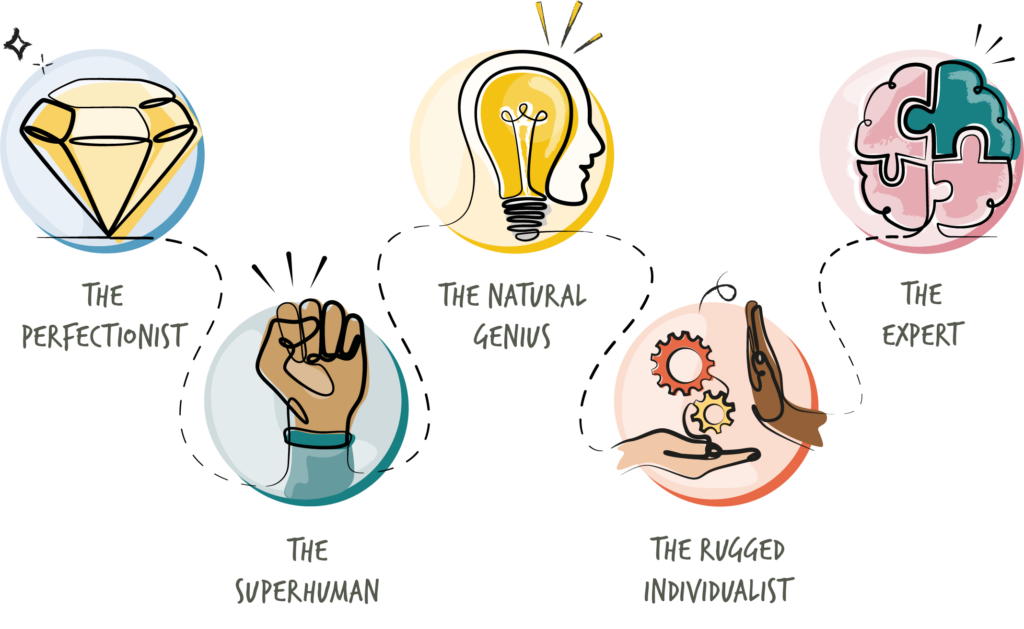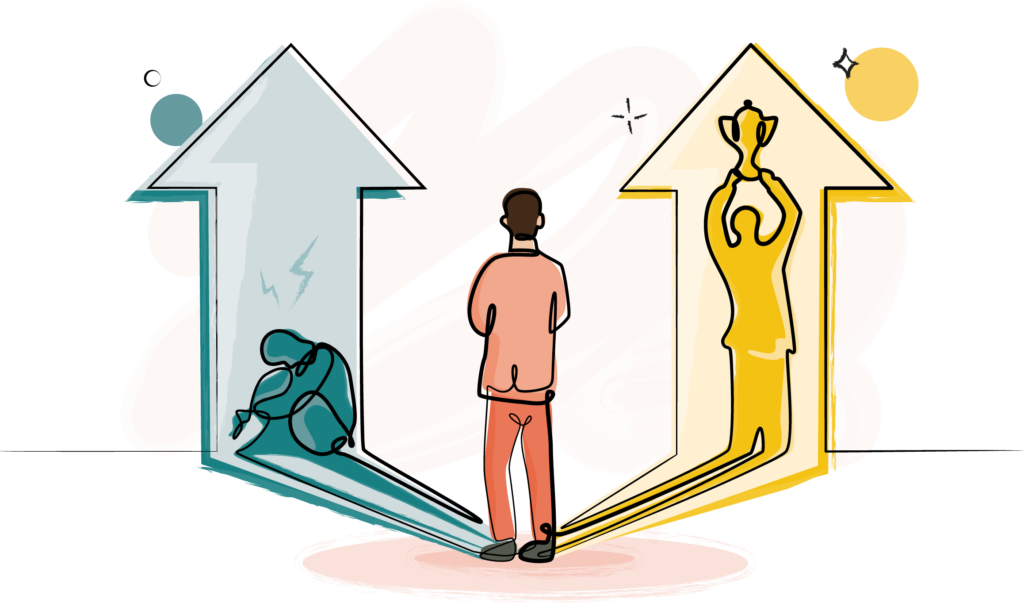TPC Team
Picture this. You’ve spent years building up your professional expertise. You put in the grind, established a solid reputation and now people are starting to turn to you as the go-to expert in your field. They’re asking you to lead talks, join panels, take part in conferences and mentor others, and they’re paying big money to get a piece of that genius that they know can really transform their business.
That’s when the fear starts to creep in. Surely, someone is going to realise that you don’t really know what you’re doing. It’s only a matter of time before they find out you’re a fraud.
If you’re sitting there thinking that this scenario is scarily accurate, trust us, you’re not alone. What you’re feeling is called imposter syndrome, and roughly 80% of people have admitted to having it (and that’s not counting the 20% that aren’t prepared to accept the truth…)
It can happen to anyone
In the above scenario, we’re making the assumption that you’re pretty high up in your career, but imposter syndrome doesn’t discriminate. Anyone can be affected, regardless of job or social status. That being said, there is evidence that suggests that imposter syndrome correlates with success.
The more skilled you become, the more you feel like a fraud. In turn, you set the bar for your success impossibly high, meaning even more pressure on yourself to be the best and keep others from recognising your faults.
Typically, those who face imposter syndrome fall into one of five categories:
- The perfectionist – someone who sets near-impossible goals for themselves and hates to delegate
- The superhuman – someone who always works harder than everyone else to cover up feeling like a fraud
- The natural genius – someone who is naturally smart/talented and finds it difficult to do things outside their comfort zone
- The rugged individualist – someone who avoids asking for help because they see it as a sign of weakness
- The expert – someone who feels like they’ve tricked their way into their role and don’t deserve to be there

The way we perceive success is such a big part in how we view ourselves. Often, it’s easier to chalk things up to dumb luck than to admit that we deserve what we have, which is terrible, when you think about it. That’s why we decided to delve a bit deeper into this phenomenon and plot out the ways we can reframe and counteract these feelings.
Reflecting, acknowledging and overcoming
Last month, we invited a panel of experts to take part in a fireside chat all about facing imposter syndrome head-on.

Fiona Chorlton-Voong
Fiona is the COO and co-founder of The Portfolio Collective, as well as a certified MBTI coach. She has worked developing brand strategies in high-end fashion houses and as a strategist for technology enterprises and professional services firms.

Rob Wright
Rob is a copywriter, graphic designer, editor and resilience specialist who helps companies and individuals connect with their audiences through creative communications and practice the emotional and mental insights needed to recover during tough times.

Maria Evans
Maria is a researcher, trainer and coach with a particular devotion for supporting working women. She is hugely passionate about achieving genuine equality, diversity and inclusion in the workplace.
As you can imagine, the conversation was deeply personal, revelatory and filled with inspiring advice and insights to help portfolio professionals recognise imposter syndrome and start to normalise those feelings of doubt to strip them of their power.
Here are a few of the key lessons we came away with.
1. Stop comparing up
Often, there’s the perception that everyone around you is winning and you’re not. We tend to look at what others have and compare that with what we don’t have. Social media only fuels this issue, allowing people to present themselves as the perfect version of what they want to be.
What we’re not seeing is all the effort and hard work that goes on behind the scenes. No one becomes extraordinarily successful off the back of nothing. Everyone is working hard to get where they want to be.
“We spend too much time looking at the gap between where we think we are and where we think we ought to be and that pattern of behaviour becomes self-destructive.”
Our advice? Stop comparing up and start comparing down. Rather than looking at what you don’t have, look at what you do have that you didn’t have before. When you stop and recognise your growth and progress, you can be more objective about the hard work and skill it took to get there.
2. Give yourself the time to reflect
Fear is a very real feeling. Your instinct is to try to hide away from it, but by labelling and owning it, you take back the power. If you recognise that you are feeling overwhelmed or fraudulent, don’t let that feeling become consuming. Stop and ask yourself: why do I feel this way and are these feelings of self-doubt valid?
Maybe you got some bad feedback and it’s eating away at you. Feedback is great, when it’s constructive. But not all feedback is right. If you feel like someone was especially harsh, ask a few other people what they think to see if it measures up. Sometimes, there is something you genuinely have to work on. Other times, it’s just one person’s opinion.
Having the skills to identify and manage your emotions can help you overcome the cognitive distortions that lie at the heart of imposter syndrome. It’s about giving yourself the time to reflect and recognise that something you’re thinking or feeling is not the objective truth. It’s just the version of how your brain is reacting to something in the moment. We’re so quick as humans to pounce on that initial feeling, and we forget that what we’re feeling isn’t always what is real.

3. Sharing is the first step towards de-stigmatising
When you don’t tell anyone about your imposter syndrome, you’re only perpetuating those feelings of inadequacy. If we all kept everything to ourselves, no one would recognise the commonality of this experience. That’s what makes you feel isolated, and that’s what keeps you from acknowledging and celebrating your success. Chances are, everyone has felt this way at one point or another – we just aren’t talking about it enough.
“We’re all probably looking at each other thinking, ‘they’re so together’. Actually, it’s about trying to be honest about the struggles we all have and saying success is a complicated construct and it’s messy.”
It’s important to show the stuff that is going on beneath the surface and the things that are fuelling perfectionism, burnout, overcompensating and self-doubt. We need to get more comfortable with asking for help. One of the good things about the TPC community is that people leave their egos and the door and share that they have flaws and need help. Community is all about supporting each other. So why not reach out and see if others are going through the same thing?
The more we can deconstruct imposter syndrome, the better it is for everyone.
4. Recognise that a bit of self-doubt can be a good thing
If you have no doubt whatsoever, you might not be trying new things. If you have too much, there’s misery and stress that comes with it. So how do you find the right balance?
Sometimes it’s just about reframing the experience and seeing the silver linings. When you face imposter syndrome, you’re experiencing the sensation of going somewhere you haven’t been before. There’s bravery and courage required to move forward – the only way to combat that fear is to walk through the unknown.
“All growth happens at the edge of our comfort zone. Get comfortable being uncomfortable. Unless you go to that edge, you’re not going to grow.”
Fear is a feeling you should welcome rather than push away. If you’re not coming face-to-face with imposter syndrome, maybe that’s an indication that you’re not pushing yourself hard enough.

5. Give your imposter syndrome a silly name
The quickest way to push back against imposter syndrome is to strip it of its power. The best way to do that? Give it a silly name and a personality (which is a fantastic tip provided by event attendee and community member Alex Pitt). When you humanise the voice inside your head and attribute it with ridiculous or absurd traits, it becomes more difficult to take it seriously.
Sometimes this is called naming. Sometimes it’s referred to as ‘creating a monster’. No matter what you call it, the end goal is simply to reframe those feelings and highlight the absurdity that lies at the heart of thinking you’re a fraud when you achieve valid and hard earned success.
When your monster comes up, you can acknowledge it, say thank you for coming and listen to what it has to say. Then, you can stand up to it. By creating distance between yourself and what you’re feeling, you can manage it a bit better.
Strategies for dealing with imposter syndrome
Everyone handles feelings of inadequacy differently, some more productively than others. That’s why it can help to have a few tricks and tips to help you when it comes time to face those feelings of doubt head-on. Here are a few of the top tips from our experts:
1. Keep a success diary. When someone says something nice about you, when you reach a milestone and when you complete a difficult project, write it down! That way, you have a record of all your positive moments to help rebuild your confidence after a negative experience.
2. Listen to your ‘morning voices’*. When you wake up, instead of going straight for your phone and scrolling through the endless noise of social media, take some quiet time to reflect and think about your day. Ask yourself what you want to do to keep yourself in connection with your goals. It’s all about being intentional and showing up as your best self.
*Phrase coined by Rob Wright
3. Schedule dedicated end-of-day reflection time. This could be at night right before you go to bed or directly after work. You could take a walk or have a long bath – whatever helps you really focus and unwind. Ask yourself what went well today? What could I have done differently? How did I show up as my best self? This is the perfect time to affirm and celebrate yourself and take inventory of your day.
“Your life is a journey. You’re always going to be learning and there are tools we should be sharing with more and more people to help us cope with these feelings.”

Remember, you’re in good company
Albert Einstein once referred to himself as a ‘voluntary swindler’, suggesting his work didn’t deserve the acclaim it received. Maya Angelou wrote 11 books and each time she finished she worried she would finally get found out as a fraud. Lady Gaga has admitted to still feeling like a loser high school kid that has to constantly remind herself of her success.
In other words, you’re in good company. Even some of the greatest minds and creatives feel inadequate at times. All it takes is a bit of self-reflection, affirmation and the constant reminder that you are good enough and you do deserve your success.
Do you have any other tips for dealing with imposter syndrome? Share them in our community or in the comment section below.
Think this sounds like the right path for you? Come along to our monthly Community Welcome Call for new members to find out what a portfolio career could look like and how The Portfolio Collective can help you take those first steps towards professional success – and don’t forget to connect with our community!







